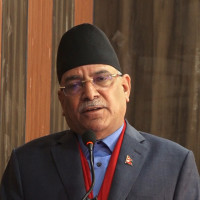- Thursday, 23 October 2025
Excess iodine abetting thyroid dysfunction: Experts
BY AJITA RIJAL,Kathmandu, Feb. 14: Iodine is important to boost the functioning of the thyroid gland to produce hormones that helps tissue repair, regulate metabolism, and promote growth and development of the body.
Iodine is a trace mineral, and it is only found naturally in seafood and plants near the sea, and due to the geographical location, there is a lack of iodine in Nepal’s land and sand. So, the government has suggested taking iodine fortified salt to provide a more concentrated dose of the mineral to tackle iodine deficiencies and its consequences like goiter.
However, health experts have warned that high dose of salt intake is creating health hazards among people.
Iodised salt has reached each and every kitchen and people are overdosing on iodine as they have more food items enriched with salt on their platter, said Dr. Uma Koirala, a nutritionist.
“Excessive salt intake is already a leading cause of non-communicable diseases including hypertension, heart and kidney ailments. Also, excess iodine is adding to thyroid
dysfunction which can affect the brain and the nerves.”
Reducing salt intake can also lessen intake of excessive iodine and problems caused by it, added Dr. Koirala.
However, Dr. Koirala warned that misinterpretation of iodine ‘overdosing’ could deliver wrong message, leading to the public avoiding iodised salt.
“Iodised salt should be consumed in moderation as it is very essential for overall health,” she suggested.
According to the micronutrient survey 2016, it was found that the amount of iodine in Nepalese food was higher than the standard set by the World Health Organisation (WHO).
The survey showed that 67 per cent of the population consumed more than 40PPM of iodine. Health experts have been claiming that the problem of hyperthyroidism (a disease caused by excess iodine in the body) has increased due to excess iodine.
Health experts suggested that adults should consume less than 5 grams of salt daily and children after 12 months of age should intake a maximum of 2 grams of salt in daily meals.
Govt to lower salt iodine level
The government is going to review the issue of using the amount of iodine in salt. “We have proposed setting the upper limit of iodine concentration in the salt and high-level meetings with concerned stakeholders has already been held,” said Lila Bikram Thapa, chief of Nutrition Section at the Family Welfare Division under the Department of Health Services.
The Department of Food Technology and Quality Control is also holding discussions with the experts based on the national and international studies about details of iodine contents, said Thapa. The WHO recommends iodine concentration at 15 to 40 ppm (parts per million) per kilo of salt.
However, the Salt Trading Corporation, which imports and distributes salt in Nepal, fortifies iodine at 50 ppm per kilo, which is higher than the recommended dosage.
Thapa said that the higher iodine level was mandated earlier in 1990s with the assumption that some amount of iodine would dissipate due to the storage and long duration of transportation. But now, it is available across the nation shortly due to easy access of transportation, he added.
The Agriculture Service Act, 2023 of the Ministry of Agriculture has established a standardization committee for the purpose of food regulation and it will work to level the iodine content in fortified salt, said Thapa.
Thapa informed that discussions are being held with a secretary-level committee under the chairmanship of the secretary at the Ministry of Agriculture to fix the amount of iodine level in salt.

















